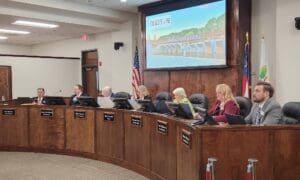When the Peachtree City Council in 2007 approved the annexation of 782 acres on the city’s northwestern border, resident David Worley didn’t just complain about the deal.
Worley, an attorney, took his grievance to court, filing a lawsuit that twisted its way through the legal system until last week when the Georgia Court of Appeals struck down the annexation, which would have added 1,075 homes inside the city limits.
Last week the Peachtree City Council voted not to challenge the decision. But one of the developers involved: John Wieland Homes and Neighborhoods or Brent Scarbrough and Company, has decided to seek an appeal of the dispute to the Georgia Supreme Court.
Worley, in an interview last week, said he filed the suit because he thought the annexation had too many homes given the land area.
“It would have a major impact in the east part of the city, which is where I live basically,” said Worley, who lives in the Kedron Village area.
Worley said he also was concerned about the start-up costs to the city in addition to the need to fund additional city services for the area.
Worley said he knew some other residents who also opposed the zoning.
“There were a number of people I talked to who were concerned about the density of the development,” Worley said.
Worley’s suit prevailed by challenging the annexation since it created a mass of city land that completely surrounded a smaller tract of land which remained part of the unincorporated county. Because the smaller tract was not contiguous to the unincorporated county, it was in effect made an “island,” a result that made it illegal under Georgia law.
The city later approved a second annexation to address the “island” issue, but the court ruled that the second annexation did not make the first one moot.
Worley, who handles mostly securities litigation for the Page Perry law firm in Atlanta, said he was at work last week when he happened across the Appeals Court’s opinion, which overturned the decision of visiting Superior Court Judge Brian Amero of Henry County.
“I’m hopeful this gives the city the opportunity to just reevaluate the annexation and the size of the development on the property if it is eventually developed,” Worley said.
He also said the city should take another look at the economic assumptions that were made as part of the annexation based on the number of homes that would sell each year until the development was finished.
The real estate market has changed significantly since then, Worley added.
Worley said while he was happy to have won the decision at the appellate level, he also was pleased to have worked with City Attorney Ted Meeker on the matter.
“The city attorney and I have been able to work on this very well over the last three years,” Worley said. “Obviously we have different views but the city has been very well represented.”










Leave a Comment
You must be logged in to post a comment.